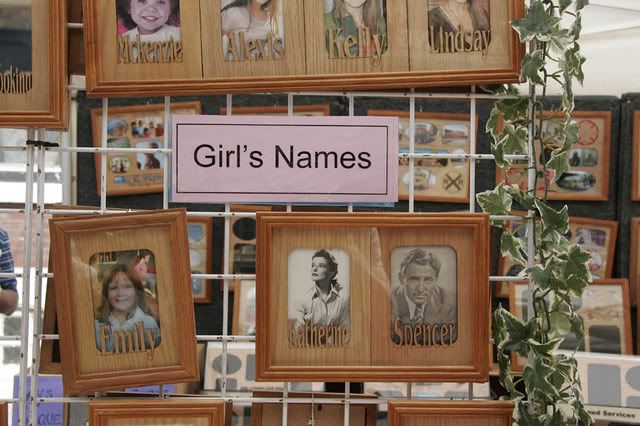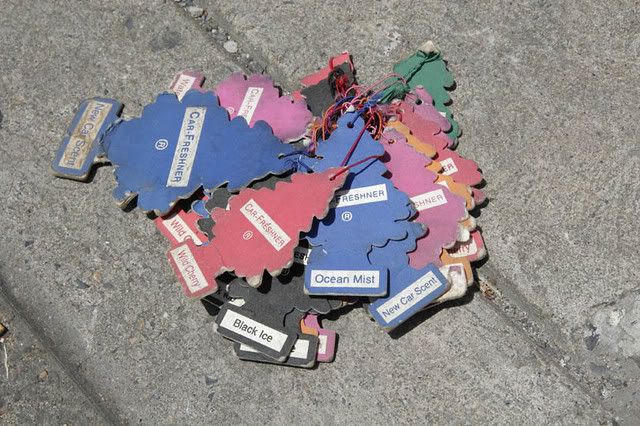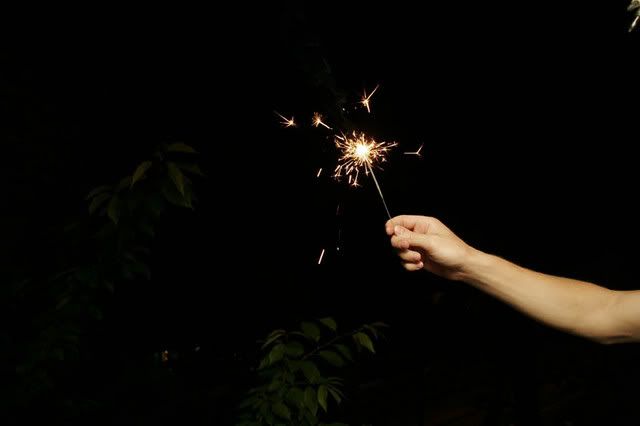Thursday, May 31, 2007
Perpetually Churning It Up
Why is it that a photograph made from a view camera can be matted and framed and hung on a wall for a lifetime as a work of art? I would have to argue, however, that the people who would do this are becoming extinct. That modern photography, with its love of quantity and contextualization, has taken over. A new kind of viewer appreciation is occurring, has been occurring. One photograph doesn’t have to have such a profound and dramatic lasting impression on you, as it did in the past-that past where you would want to frame it and have it forever on your wall. Photographs now have a shorter lifespan- and we can’t condemn them for this, we can’t take away their relevance or significance- all negative connotations to the short-lived must be thrown out the window. A photograph can satisfy you like a meal or a magazine- you can devour it and get much satisfaction from it. And soon, you’ll be hungry for more.
Tuesday, May 29, 2007
Thursday, May 24, 2007
It's Really Real
I just finished reading an amazing short story in the April 2007 issue of Harper's Magazine entitled "The Wizard Of West Orange" by Steven Millhauser. Set in the late 1880's, the story is in the form or journal entries from the librarian at a prestigious center of research and experimentation, and centers around an invention called the haptograph. The librarian earns the privilege of becoming the test subject for this new device, which will "do for the skin what the phonograph does for the ear, the kinetoscope for the eye." "Might we be surrounded by immaterial presences that move against us but do not impress themselves upon the touch-spots of our skin? Our vision sharpened by microscopes. Haptograph as the microscope of touch."
The story, which for me brings to mind obvious comparisons to Flatland, involves the idea that our senses have serious limitations; that an extraordinary world of stimuli and experience is at our disposable, if only we learn to acknowledge our limitations and then work, or invent something, to overcome them. It also questions the authenticity of an experience when technology is involved in enhancing that experience.
"In old body, could hold out my hand and grasp a pencil, a paperweight. In new body, could hold out my hand and grasp an entire room with all its furniture, an entire town with its chimneys and saltshakers and streets and oak trees. But more than that- more than that. In new skin i was able to touch directly- at every point on my body- any object that presented itself to my mind: a stuffed bear from childhood, wing of a hawk in flight, grass in a remembered field. As though my skin were chock-full of touches, like memories in the brain, waiting for a chance to leap forth."
I really recommend the story- well, to everyone, but specifically to photographers, of which it might do some good in waking your senses, shaking you up, making you think a bit (also for its great references to vision and light). It made me think of the development of my vision- I'm seeing things now that six years ago i would have totally ignored. To me, the development of vision involves the imagination much more than anything else- i'm "seeing" new things because my brain has learned to be stimulated by them, and to project some kind of meaning or story into the subject. So, what if i was able to live for three lifetimes- how much more than the average person would i be able to see?
It makes me want to do an experiment in which i make a diorama of beautiful little visual stimuli- and sit down with it at random intervals for the rest of my life, and record what i see. Or pick a room in a building somewhere that will forever remain unchanged, visiting it and trying to see new things each time. Will the entries become deeper and more complex as i age, considering i continue on a similar path of life and continue to garner more and more experience and knowledge? And if the elements are remaining unchanged, how is it that i can possible see more?
I really do believe that seeing is much more than the physical act- it is circumstancial and indicative to your current state of mind; a projection of your collective consciousness at that instant, and only that instant, you are called to employ it. It will change and develop as you continue to do so. In the same way your life will be altered after a traumatic event, so too will your vision. To put it more simply- seeing is life.
"...Then everyone will know what i have come to know: that the world is hidden from us- that our bodies, which seem to bring us the riches of the earth, prevent the world from reaching us. For the eyes of our skin are closed. Brightness streams in on us, and we cannot see. Things flow against us, and we cannot feel. But the light will come.
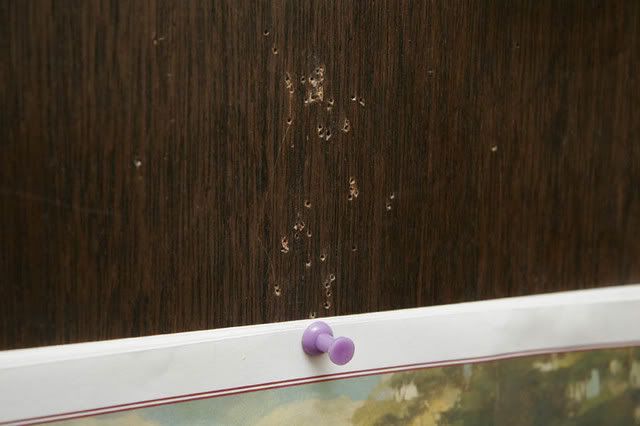
Tack Holes Above Calendar
The story, which for me brings to mind obvious comparisons to Flatland, involves the idea that our senses have serious limitations; that an extraordinary world of stimuli and experience is at our disposable, if only we learn to acknowledge our limitations and then work, or invent something, to overcome them. It also questions the authenticity of an experience when technology is involved in enhancing that experience.
"In old body, could hold out my hand and grasp a pencil, a paperweight. In new body, could hold out my hand and grasp an entire room with all its furniture, an entire town with its chimneys and saltshakers and streets and oak trees. But more than that- more than that. In new skin i was able to touch directly- at every point on my body- any object that presented itself to my mind: a stuffed bear from childhood, wing of a hawk in flight, grass in a remembered field. As though my skin were chock-full of touches, like memories in the brain, waiting for a chance to leap forth."
I really recommend the story- well, to everyone, but specifically to photographers, of which it might do some good in waking your senses, shaking you up, making you think a bit (also for its great references to vision and light). It made me think of the development of my vision- I'm seeing things now that six years ago i would have totally ignored. To me, the development of vision involves the imagination much more than anything else- i'm "seeing" new things because my brain has learned to be stimulated by them, and to project some kind of meaning or story into the subject. So, what if i was able to live for three lifetimes- how much more than the average person would i be able to see?
It makes me want to do an experiment in which i make a diorama of beautiful little visual stimuli- and sit down with it at random intervals for the rest of my life, and record what i see. Or pick a room in a building somewhere that will forever remain unchanged, visiting it and trying to see new things each time. Will the entries become deeper and more complex as i age, considering i continue on a similar path of life and continue to garner more and more experience and knowledge? And if the elements are remaining unchanged, how is it that i can possible see more?
I really do believe that seeing is much more than the physical act- it is circumstancial and indicative to your current state of mind; a projection of your collective consciousness at that instant, and only that instant, you are called to employ it. It will change and develop as you continue to do so. In the same way your life will be altered after a traumatic event, so too will your vision. To put it more simply- seeing is life.
"...Then everyone will know what i have come to know: that the world is hidden from us- that our bodies, which seem to bring us the riches of the earth, prevent the world from reaching us. For the eyes of our skin are closed. Brightness streams in on us, and we cannot see. Things flow against us, and we cannot feel. But the light will come.

Tack Holes Above Calendar
Wednesday, May 16, 2007
No Storytime Today
I spent the majority of yesterday on my bike, visiting as many polling places as i could. I had a great experience at my polling place in the Girard Estates neighborhood in South Philly, where i chatted with the old ladies manning the books, witnessed some heated debates out on the sidewalk about casino reform and general public apathy, and got a tingly feeling at the notion that more people may have a sense of civic duty than i previously believed. Most of the polling places had little if any action- i should have been out in the morning or late evening- but they are always rich with imagery.
I could go off on a million tangents. One thing that voting always brings to mind is the idea of humans as imperfect beings. When i see a bunch of old ladies writing in ledgers with pens, fumbling through cards, relaying numbers to eachother, often having to repeat themselves several times- the whole abstract act of voting suddenly becomes tangible as this long and crazy process with a million steps that involves just as many people along the way.
And the sign disasters on walls- taped and arranged in any way imaginable- these reflect the frenetic personalities of the people involved in poliltical campaigning, who will overlook a superifcial formality because they are focused on the big picture.
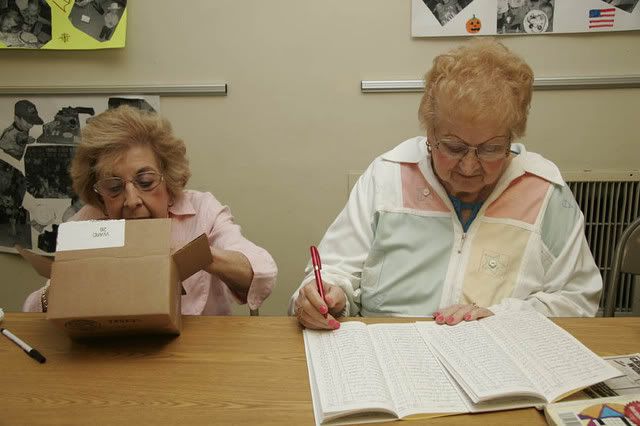
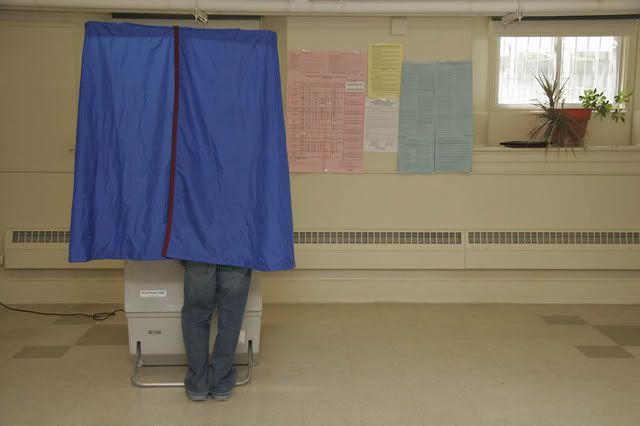
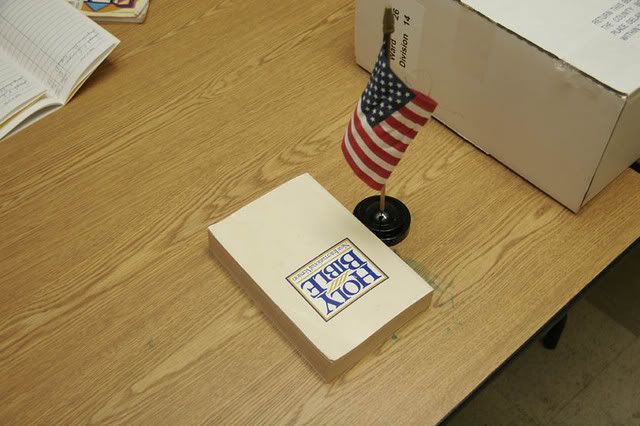
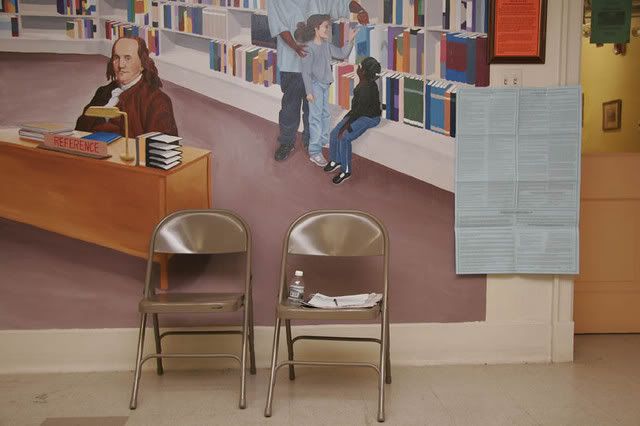
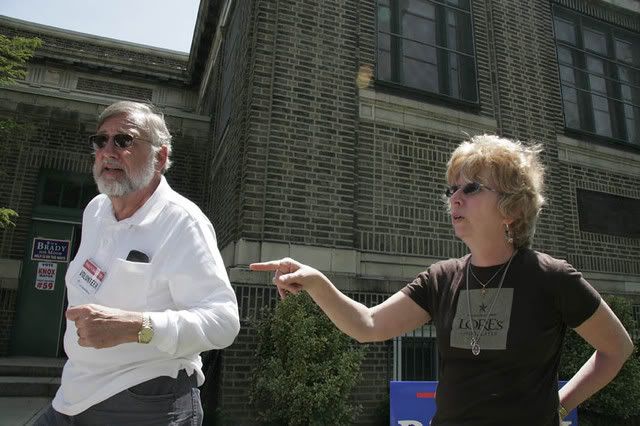
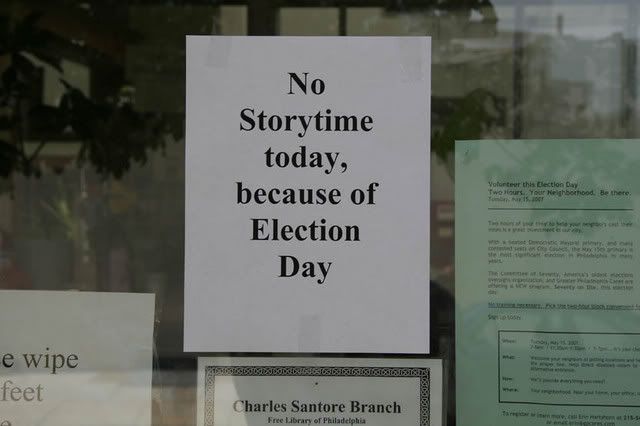
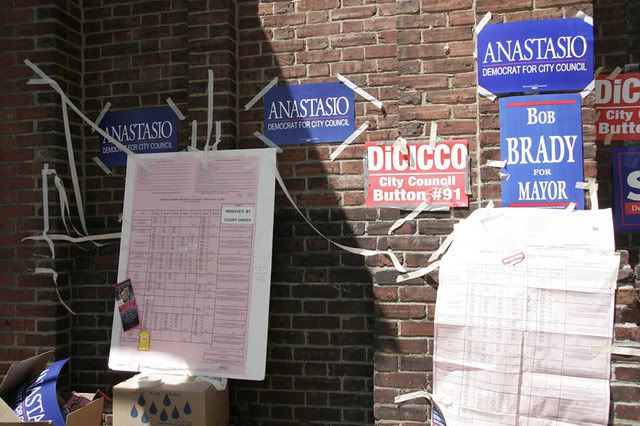
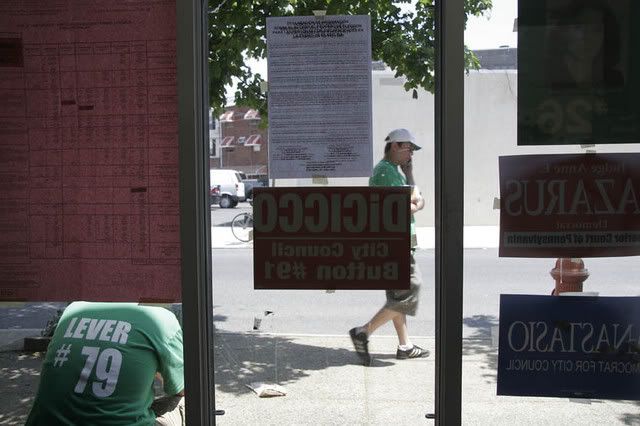
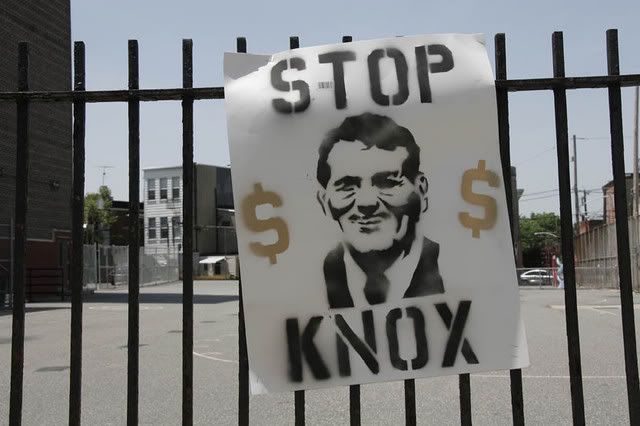

I could go off on a million tangents. One thing that voting always brings to mind is the idea of humans as imperfect beings. When i see a bunch of old ladies writing in ledgers with pens, fumbling through cards, relaying numbers to eachother, often having to repeat themselves several times- the whole abstract act of voting suddenly becomes tangible as this long and crazy process with a million steps that involves just as many people along the way.
And the sign disasters on walls- taped and arranged in any way imaginable- these reflect the frenetic personalities of the people involved in poliltical campaigning, who will overlook a superifcial formality because they are focused on the big picture.










Subscribe to:
Comments (Atom)
